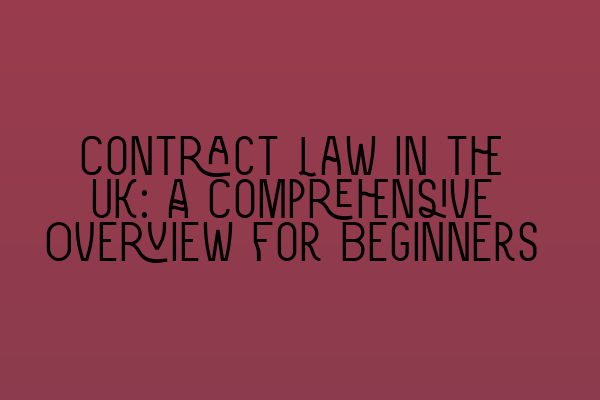Contract Law in the UK: A Comprehensive Overview for Beginners
Welcome to our in-depth guide on Contract Law in the UK! Whether you’re a law student, a budding entrepreneur, or simply someone curious about the legal framework governing business transactions in the United Kingdom, this comprehensive overview will provide you with the foundational knowledge to understand and navigate contract law with confidence.
Why is Contract Law Important?
Before delving into the intricacies of contract law, it’s essential to understand its significance. Contracts form the backbone of almost every commercial interaction and transaction. They provide a legal framework for individuals and businesses to establish rights and obligations, ensuring predictability, fairness, and accountability.
What is a Contract?
At its core, a contract is a legally binding agreement between two or more parties. For a contract to be enforceable, certain elements must be present:
1. Offer and Acceptance: An offer is made by one party and accepted by another, indicating the intention to create a legal relationship.
2. Consideration: This refers to something of value given in exchange for goods, services, or promises.
3. Intention to Create Legal Relations: Both parties must demonstrate a genuine intention to be legally bound by the agreement.
4. Capacity to Contract: All parties involved must have the legal capacity to enter into the contract. This means they must be of sound mind, not minors, and not under any legal constraint that would render the contract void.
5. Legal Purpose: The contract’s objective must not be illegal or against public policy.
Types of Contracts
Let’s explore some common contract types you may encounter:
1. Express Contracts: These contracts are explicitly stated, either orally or in writing, leaving no ambiguity regarding the agreement’s terms.
2. Implied Contracts: Although not explicitly stated, these contracts are formed based on the parties’ actions or conduct.
3. Void Contracts: These contracts are considered invalid from the start and hold no legal effect. For example, a contract that is illegal in nature or entered into under duress would be void.
4. Voidable Contracts: These contracts are initially valid, but certain circumstances allow one party to avoid their obligations. For instance, contracts entered into by individuals lacking the mental capacity to fully comprehend the agreement can be voidable.
Key Principles in Contract Law
Several fundamental principles underpin contract law in the UK. Understanding these principles will help you navigate the intricacies of contractual agreements:
1. Offer and Acceptance: An offer must be clear and communicated to the other party. Acceptance should be unequivocal, matching the terms of the offer.
2. Consideration: Consideration ensures that both parties give and receive something of value. It need not be monetary but should have legal sufficiency.
3. Intention to Create Legal Relations: Both parties must intend to be legally bound by the contract. Social and domestic agreements typically lack this intention.
4. Privity of Contract: Generally, only parties to a contract can enforce its terms. Third parties often lack the necessary standing unless specifically mentioned in the contract.
5. Breach of Contract: Should one party fail to fulfill its obligations, it amounts to a breach of contract. Remedies may include damages, specific performance, or injunctions.
Contract Law and Business Transactions
Contract law plays a critical role in business transactions, forming the basis of commercial relationships. Here are some essential concepts related to contract law in a business context:
1. Drafting Contracts: Ensuring the contract is clear, precise, and covers all relevant terms is crucial. Seek professional advice when drafting complex agreements.
2. Standard Terms and Conditions: Many businesses use standard terms and conditions to streamline their transactions. It’s important to ensure these terms are fair and reasonable to avoid legal challenges.
3. Contract Disputes: Disputes can arise in contract negotiations, interpretation, or performance. Mediation, arbitration, or litigation may be necessary to resolve these disputes effectively.
4. Consumer Contracts: Specific regulations protect consumers in contracts where there may be an imbalance of power. These include provisions on unfair contracts terms, consumer rights, and protections against misleading or aggressive practices.
Conclusion
Contract law is the cornerstone of business dealings, ensuring clarity, fairness, and trust amongst parties. This comprehensive overview provides a solid foundation for understanding the key principles and concepts within contract law in the UK. Remember, seeking professional legal advice is always advisable when dealing with complex contractual matters.
So, whether you’re embarking on a new business venture, entering into a significant transaction, or simply interested in expanding your legal knowledge, this overview serves as a valuable resource to navigate the intricate world of contract law in the UK.
Are you ready to dive deeper into the fascinating world of Contract Law? Stay tuned to SQE Contract Law for more informative content and expert insights!
